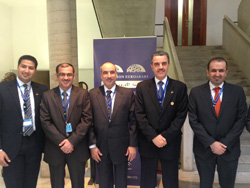

BIPA has succeeded in designing an index to measure intellectual capital components through a trouble-free methodology, benefiting in this manner from the modern literatures in the field of scientific research in public administration, this came during a presentation of a working-paper by the Executive Director of Education and Development at the Institute Ishaq Ameen, during his participation in the annual meeting of the directors and leaders of administration institutes in the Arab world and Europe, which was organized by the Arab Organization for Administrative Development in collaboration with the Euro-Arab Foundation, which was hosted by the Euro-Arab Foundation in the Spanish city of Granada during the period from 5 to 7 of the current month of May.
Mr. Ameen indicated that BIPA was able to link the intellectual capital to the development of public administration as a strategic tool, which forms a value-added that viewed positively on the achievements attained by the Institute in a short period of time since its inception in 2006, adding that the Institute has set up a research study on a sample of its staff using intellectual capital gauging index, and found that the ratio index of the intellectual capital of BIPA amounted to 65%, which is a distinct ratio based on the approved criteria and based on the relatively short time of the Institute.
Mr. Ameen added that the intellectual capital index contributes in improving and developing the works of the organization, placing the resources in the appropriate locations in the business of the organization based on gauging the human, structural and relations capital in the organization, noting that the Institute has succeeded in providing a simplified tool to measure intellectual capital indicators in the region, which will be applied to the Gulf public administration institutes for its excellence in terms of ease of implementation concerning the required inputs and ease of application with respect to getting access to the results in a calculated and simplified way that helps in the understanding of the current institutional situation.
In regard to the importance of this index in the improvement and development of businesses of the organizations, Mr. Ameen said that the interest in the subject of intellectual capital is very important as it relates to the issue of creating added value in the organization, noting that many experts believe that the lack of the ability to understand how to create a value in the organization leads to the poor provision of the necessary resources for creating this value.
Mr. Ameen explained that organizations that do not bother measuring intellectual capital index are unaware of its Business Model which leads to the inability to assess the opportunities that comes into their hands in the present and the future, consequently this ultimately leads to the failure of the business of the organization. Mr. Ameen pointed out that there are clear examples of some of the institutions that lost the opportunities of creating value in their processes, which has led to their failure and even more to their termination such as the Marconi Company in the United Kingdom and the Enron Company in the United States.
